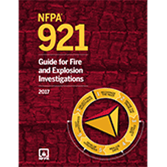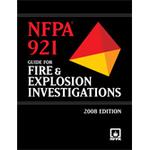Click here to purchase
New coverage in the 2011 NFPA 921 guides fire investigators through a complex process.
Updated based on recent court cases, scientific data, and trends, the 2011 edition of NFPA 921: Guide for Fire & Explosion Investigations presents the information you need for reliable field work and conclusions that hold up in a court of law. Major revisions give fire investigators, litigators, and insurance professionals more comprehensive and effective guidance for today’s world.
Major revisions in NFPA 921 help you render opinions that stand up to scrutiny:
- An all-new section on Report Review Procedure in Chapter 4 outlines the review process in fire investigation and discusses peer vs. technical review.
- Rewritten Chapter 18, Cause helps ensure fire investigators use scientific methodology when developing hypotheses, to avoid Daubert challenges resulting from the absence of supportive evidence, commonly known as “negative corpus.”
- Revised Chapter 21, Explosions includes a critical update of the science and technology affiliated with explosions, along with new illustrations and photos.
- Rewritten Chapter 23, Fire Deaths and Injuries explains how medical reports such as blood tests and tissue samples can help investigators determine fire origin and cause. Learn when to request toxicology reports and how to interpret findings.
- Chapter 25, Motor Vehicle Fires introduces expanded sections covering recreational vehicles and agricultural equipment. Only the 2011 NFPA 921 includes complete data on all types of vehicles, including electric/hybrids.
- Revised Chapter 26, Wildfires has new visuals to assist personnel charged with investigations involving this growing fire problem.
- Updated Chapter 12, Safety explores major risks and covers PPE and other safety protocols that protect fire investigators on the job.
Use the 2011 NFPA 921’s total system for safe and accurate fire investigations.
The 2011 NFPA 921 addresses everything from basic methodology to collecting evidence to failure analysis. Guidelines cover all types of incidents from residential fires to management of complex investigations such as high-rise fires and industrial plant explosions. The latest edition is essential for fire service members, bomb/arson and forensic specialists, insurance professionals, attorneys, and trainers.
Product Details
- Published:
- 01/03/2011
- ISBN(s):
- 9781616657147
- Number of Pages:
- 347


